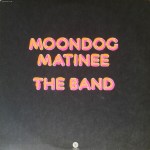In the case of this album, no. The copies with the later covers always win our shootouts.
This is not the least bit surprising to us. We’re the guys who are all about sound, not originality.
We discussed it in this commentary: Are hot stampers just original pressings?
The links below should be helpful to those looking for the highest quality sound on vinyl.
- Hot Stamper Pressings which Sound Their Best on the Right Reissue Available Now
- Records We’ve Reviewed which Sound Their Best on the Right Reissue
Side One
- Ain’t Got No Home
- Holy Cow
- Share Your Love
- Mystery Train
- Third Man Theme
Side Two
- Promised Land
- The Great Pretender
- I’m Ready
- Saved
- A Change Is Gonna Come
AMG Review
The Band essentially went back to being the Hawks of the late ’50s and early ’60s on this album of cover tunes. They demonstrated considerable expertise on their versions of rock & roll and R&B standards like Clarence “Frogman” Henry’s “Ain’t Got No Home,” Chuck Berry’s “The Promised Land,” and Fats Domino’s “I’m Ready.”
Rolling Stone Review
Like most oldies albums, part of the pleasure here lies in seeing what inspirations the Band felt should be resurrected from their early roadhouse beginnings. In the main they’ve drawn well, choosing rhythm and blues styles that run the gamut from Clarence “Frogman” Henry to the Platters, all refined into the wood-smoked ambience that covers the ex-Hawks like a friendly shoe. They take each selection straight, casual and almost off the cuff. There are few surprises, even less tension, and if the album contains a distinct lack of outstanding moments, the group’s consistency has seldom been more apparent or necessary.
A sense of humor helps too, amply demonstrated by Levon’s magnificently cracked reading of “The Great Pretender” or the frogman segment of “Ain’t Got No Home.” The best things on the set are Fats Domino’s “I’m Ready,” leading and pummeling the way into Leiber-Stoller’s (via LaVerne Baker) “Saved.” “Holy Cow” is a hat-tip to Allen Toussaint, whose horn arrangements are given tribute throughout the album, and “Share Your Love” features Richard Manuel in the only cut which manages to break out of the jook-joint concept and sit on its own as a fully realized touch of classic.
Wikipedia on The Band
The Band’s music fused many elements: primarily old country music and early rock and roll, though the rhythm section often was reminiscent of Stax or Motown, and Robertson cites Curtis Mayfield and the Staple Singers as major influences, resulting in a synthesis of many musical genres. As to the group’s songwriting, very few of their early compositions were based on conventional blues and doo-wop chord changes.
Every member was a multi-instrumentalist. There was little instrument-switching when they played live, but when recording, the musicians could make up different configurations in service of the songs. Hudson in particular was able to coax a wide range of timbres from his Lowrey organ; on the choruses of “Tears of Rage”, for example, it sounds like a mellotron. Helm’s drumming was often praised: critic Jon Carroll declared that Helm was “the only drummer who can make you cry,” while prolific session drummer Jim Keltner admits to appropriating several of Helm’s techniques.
Singers Manuel, Danko, and Helm each brought a distinctive voice to the Band: Helm’s southern voice had more than a hint of country, Danko sang in a tenor, and Manuel alternated between falsetto and baritone. The singers regularly blended in harmonies. Though the singing was more or less evenly shared among the three men, both Danko and Helm have stated that they saw Manuel as the Band’s “lead” singer.
Robertson was the group’s chief songwriter, but he sang lead vocals on only three studio songs released by the Band (“To Kingdom Come”, “Knockin’ Lost John” and “Out Of The Blue”). This role, and Robertson’s resulting claim to the copyright of most of the compositions, would later become a point of much antagonism, especially that directed towards Robertson by Helm, who, in his autobiography This Wheel’s on Fire – Levon Helm and the Story of The Band, disputes the validity of Robertson’s place as chief songwriter, as the Band’s songs were often honed and recorded through collaboration between all members. Robertson for his part angrily denied that Helm had written any of the songs attributed to Robertson[10] and his daughter later pointed out in a letter to the Los Angeles Times that Levon Helm’s solo work consists almost entirely of songs written by others. Strains appeared in the 1980s, when the bulk of songwriting royalties were going to Robertson alone while the others had to rely on income from touring. This had not arisen as an issue in the late sixties and early seventies, when a number of Band songs, mostly credited to Robertson alone, were covered successfully by other artists – such as Smith’s version of “The Weight” for the Easy Rider soundtrack LP and Joan Baez’s cover of “The Night They Drove Old Dixie Down” in 1971.
Producer John Simon is cited as a “sixth member” of the Band for producing and playing on Music from Big Pink, co-producing and playing on The Band, and playing on other songs up through the Band’s 1993 reunion album Jericho.
Further Reading
- New to the Blog? Start Here
- What Exactly Are Hot Stamper Pressings?
- Record Collecting for Audiophiles from A to Z
- How to Get the Most Out of Your Records – A Step by Step Guide

